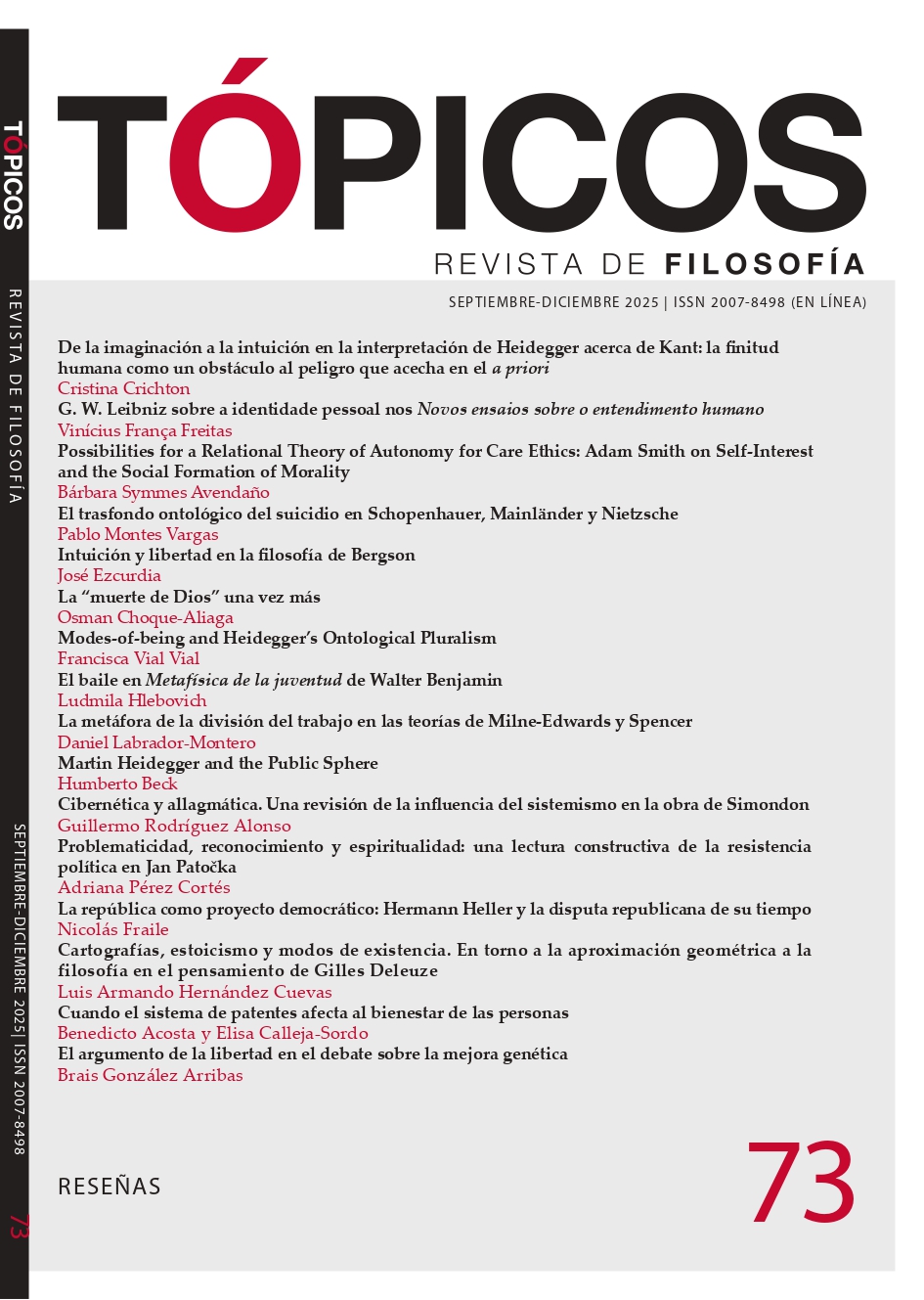Published 2025-08-22
Keywords
- Martin Heidegger,
- public sphere,
- humanism,
- truth,
- ontology
- intellectuals,
- politics,
- political theory,
- genuine thinking,
- Nazism,
- Being and Time,
- Letter on Humanism ...More
Copyright (c) 2025 Tópicos, Revista de Filosofía

This work is licensed under a Creative Commons Attribution-NonCommercial-NoDerivatives 4.0 International License.
How to Cite
Abstract
Martin Heidegger posited a fundamental contrast between genuine thinking and the realm of opinion of the public sphere. This conflict is expressed in Being and Time’s critique of the phenomenon of the “they” as an inappropriate setting for true philosophizing, and in the Letter on Humanism’s denunciation of Western metaphysics as based on a technification of thought. Exploring possible links between these ideas and Heidegger’s involvement with National Socialism can refine the discussion on the relationship between politics and philosophy in Heidegger’s thinking. Specifically, it can lead to the identification of an implicit notion of the political in Heidegger’s thought.
References
- Arendt, H. (1969). What Is Freedom? In H. Arendt, Between Past and Future: Eight Exercises in Political Thought (pp. 143-172). Viking Press.
- Arendt, H. (1971). The Life of the Mind. II. Harcourt.
- Beiner, R. (2018). Dangerous Minds: Nietzsche, Heidegger, and the Return of the Far Right. University of Pennsylvania Press. https://doi.org/10.9783/9780812295412
- Bourdieu, P. (1991). The Political Ontology of Martin Heidegger. P. Collier (trans.). Polity Press.
- Chartier, R. (1990). Les origines culturelles de la Révolution française. Éditions du Seuil.
- De Tocqueville, A. (2004). Democracy in America. A. Goldhammer (trans.). The Library of America.
- Farías, V. (1987). Heidegger et le nazisme. Verdier.
- Faye, E. (2009). Heidegger: The Introduction of Nazism into Philosophy. Yale University Press.
- Gordon, P. E. (2017). Prolegomena to any Future Destruction of Metaphysics: Heidegger and the Schwarze Hefte. In A. J. Mitchell & P. Trawny (eds.), Heidegger’s Black Notebooks: Responses to Anti-Semitism (pp. 136-151). Columbia University Press. https://doi.org/10.7312/mitc18044-012
- Habermas, J. (1987). The Undermining of Western Rationalism through the Critique of Metaphysics: Martin Heidegger. In J. Habermas, The Philosophical Discourse of Modernity: Twelve Lectures (pp. 131-160). F. G. Lawrence (trans.). MIT Press.
- Habermas, J. (1989). Work and Weltanschauung: The Heidegger Controversy from a German Perspective. J. McCumber (trans.). Critical Inquiry, 15(2), 431-456. https://doi.org/10.1086/448492
- Habermas, J. (1991). The Structural Transformation of the Bourgeois Public Sphere. T. Burger (trans.). MIT Press.
- Heidegger, M. (2000). Betr. die Notiz “Hanfstaengl contra Heidegger“ in der Münchner Süddeutschen Zeitung vom Mittwoch, den 14. Juni 1950. In M. Heidegger, Gesamtausgabe. I. Abteilung. Veröffentlichte Schriften 1910-1976. Band 16. Reden und Andere Zeugnisse eines Lebensweges (1910-1976) (pp. 452-453). Vittorio Klostermann.
- Heidegger, M. (2008a). [BT]. Being and Time. J. Macquarrie & E. Robinson (trans.). Harper Perennial.
- Heidegger, M. (2008b). Introduction: The Exposition of the Question of the Meaning of Being. In M. Heidegger, Basic Writings (pp. 41-87). J. Stambaugh & J. G. Gray (trans.). Harper San Francisco.
- Heidegger, M. (2008c). [LH]. Letter on Humanism. In M. Heidegger, Basic Writings (pp. 213-267). F. A. Capuzzi & J. G. Gray (trans.). Harper San Francisco.
- Heidegger, M. (2008d). On the Essence of Truth. In M. Heidegger, Basic Writings (pp. 111-138). J. Sallis & J. G. Gray (trans.). Harper San Francisco.
- Heidegger, M. (2014). Introduction to Metaphysics. G. Fried & R. Polt (trans.). Indiana University Press.
- Heidegger, M. (2016). Ponderings II-VI. Black Notebooks 1931-1938. R. Rojcewicz (trans.). Indiana University Press. https://doi.org/10.2979/11281.0
- Heidegger, M. (2017a). Ponderings VII-XI. Black Notebooks 1938-1939. R. Rojcewicz (trans.). Indiana University Press. https://doi.org/10.2979/11393.0
- Heidegger, M. (2017b). Ponderings XII-XV. Black Notebooks 1939-1941. R. Rojcewicz (trans.). Indiana University Press. https://doi.org/10.2979/11393.0
- Heidegger, M. (2024). Introduction to Philosophy. W. McNeill (trans.). Indiana University Press. https://doi.org/10.2307/jj.11288869
- Kant, I. (1996). An Answer to the Question: What is Enlightenment? In J. Schmidt (ed.), What is Enlightenment? Eighteenth-Century Answers and Twentieth-Century Questions (pp. 58-64). University of California Press. https://doi.org/10.1525/9780520916890-005
- Käufer, S. (2021). Publicness (Öffentlichkeit). In M. A. Wrathall (ed.), The Cambridge Heidegger Lexicon (pp. 615-616). Cambridge University Press. https://doi.org/10.1017/9780511843778.167
- Ott, H. (1993). Martin Heidegger: A Political Life. A. Blunden (trans.). Harper Collins.
- Pöggeler, O. (1993). Heidegger’s Political Self-Understanding. In R. Wolin (ed.), The Heidegger Controversy: A Critical Reader (pp. 198-244). S. Galt Crowell (trans.). MIT Press.
- Polt, R. (2017). Inception, Downfall, and the Broken World: Heidegger Above the Sea of Fog. In A. J. Mitchell & P. Trawny (eds.), Heidegger’s Black Notebooks: Responses to Anti-Semitism (pp. 74-97). Columbia University Press. https://doi.org/10.7312/mitc18044-008
- Rabinbach, A. (1997). In the Shadow of Catastrophe: German Intellectuals between Apocalypse and Enlightenment. University of California Press. https://doi.org/10.1525/9780520926257
- Rorty, R. (2000). On Heidegger’s Nazism. In R. Rorty, Philosophy and Social Hope (pp. 175-200). Penguin.
- Safranski, R. (1998). Martin Heidegger: Between Good and Evil. E. Osers (trans.). Harvard University Press.
- Sheehan, T. (1988, June 16). Heidegger and the Nazis. The New York Review of Books. https://www.nybooks.com/articles/1988/06/16/heidegger-and-the-nazis/
- Taylor, C. (2004). Modern Social Imaginaries. Duke University Press. https://doi.org/10.1215/9780822385806
- Trawny, P. (2015a). Freedom to Fail: Heidegger’s Anarchy. I. A. Moore & C. Turner (trans.). Polity.
- Trawny, P. (2015b). Heidegger and the Myth of a Jewish World Conspiracy. A. J. Mitchell (trans.). The University of Chicago Press. https://doi.org/10.7208/chicago/9780226303871.001.0001
- Villa, D. (1996). Arendt and Heidegger: The Fate of the Political. Princeton University Press. https://doi.org/10.1515/9781400821846
- Wolin, R. (1990). The Politics of Being: The Political Thought of Martin Heidegger. Columbia University Press. https://doi.org/10.7312/woli93972
- Wolin, R. (2022). Heidegger in Ruins: Between Philosophy and Ideology. Yale University Press. https://doi.org/10.2307/j.ctv36rk1cf





